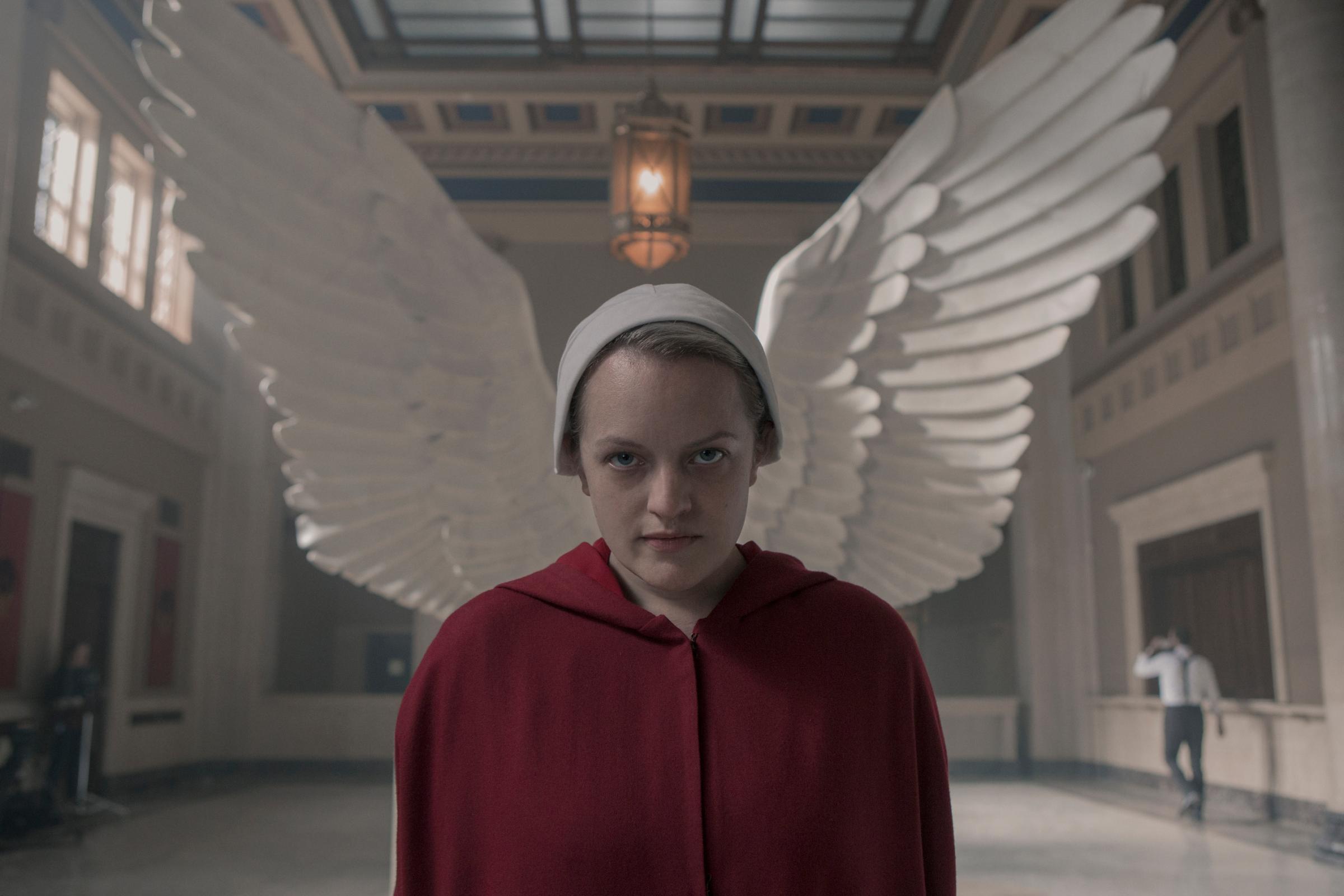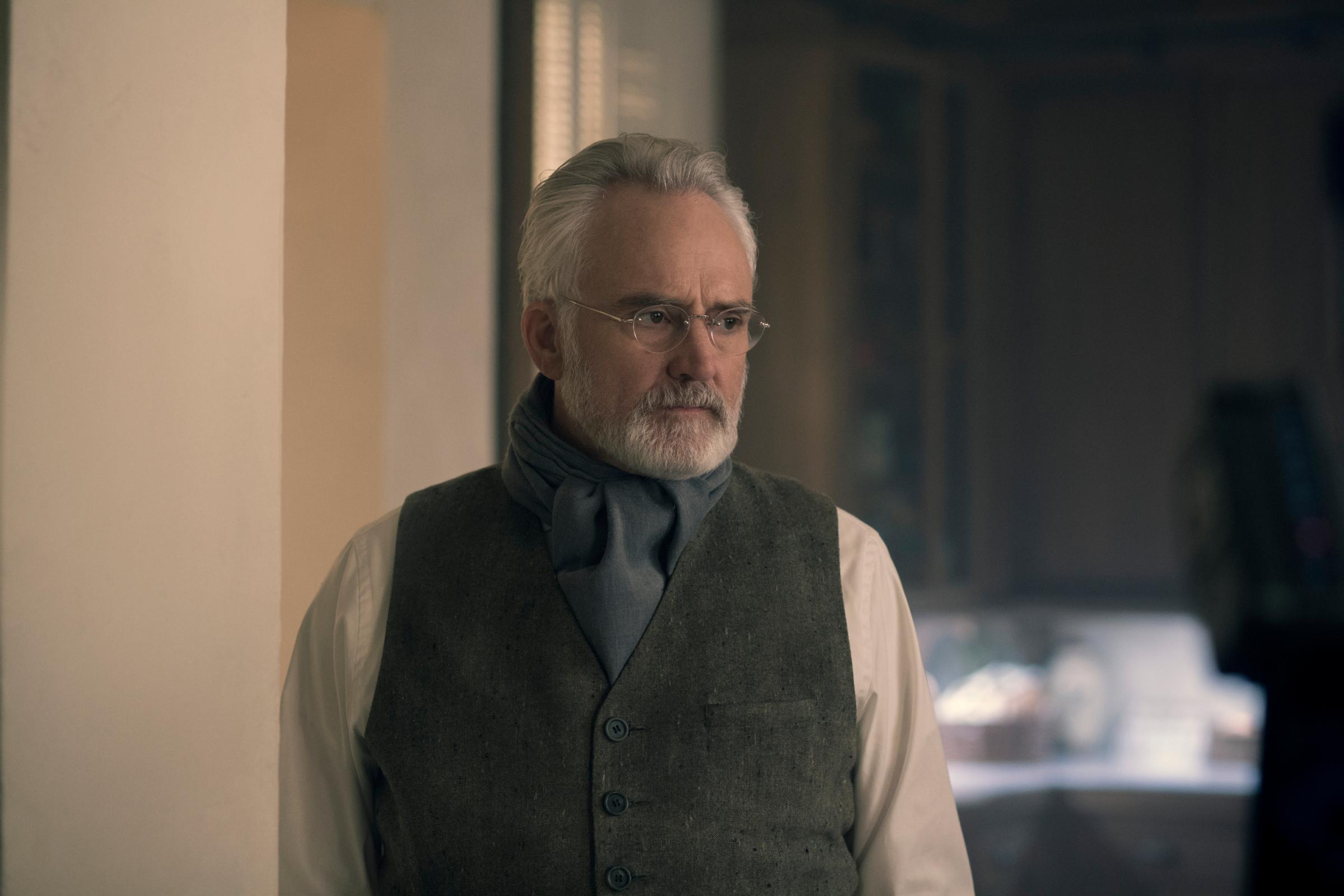There is a common misperception that Hulu’s The Handmaid’s Tale ended its powerful, if saggy, first season on the very last page of Margaret Atwood’s novel: The secret police loads Offred (played in the TV series by Elisabeth Moss) into the back of a van. She doesn’t know whether she’s headed for doom or freedom, by way of the Mayday resistance, and neither do we.
It’s easy to forget that the book continues from there, with a brilliant and absolutely crucial 12-page epilogue set at an academic conference two centuries in the future. The year is 2195, the place is a nation called Nunavit, the occasion is the 12th Symposium on Gileadean Studies and the names of local professors (Maryann Crescent Moon, Johnny Running Dog) suggest that the larger cultural context is a North American state that has re-embraced both its liberal past and its Native American roots. Atwood’s epilogue, a parody of precious academic discourse whose lightness is striking in the wake of Offred’s harrowing narrative, frames Gilead as either a reactionary blip on an arc that has bent toward progressivism or as one unfortunate extreme in an ongoing historical dialectic. It may have been a nightmare, but it wasn’t the end of the world.
I am dying for a full season of The Handmaid’s Tale set at this conference. It’s never going to happen, of course; the audience for what would amount to 13 hours of political philosophy, literary criticism and Ivory Tower in-jokes can’t possibly exceed five figures. Even so, roughly 30 episodes into a series that began as a revelation but has since become a chore, Atwood’s coda underlines how inert the TV show’s structure is compared to that of the book. A 200-year time jump jarringly recontextualizes Gilead, offsetting the gloom of Offred’s story. The Hulu version could accomplish something similar—or at least stop repeating itself—if it weren’t so invested in maintaining a uniform tone, setting and cast of characters.

The show’s second season had its moments, from the increased attention to Yvonne Strahovski’s selfish, conflicted, fascinating Serena Joy to a glimpse of Gilead’s place in global politics to Moss’s virtuosic, nearly solo performance in an episode that chronicled the second of her three escape attempts. For the most part, though, it just rehashed the misery of the previous season: Women got raped, families got torn apart, lawbreakers got executed, the hypocrisy of powerful men got a free pass. A nonsensical finale in which June (Offred’s real name) handed her new baby to Emily (Alexis Bledel), a long-suffering pal who was finally making a break for Canada, but refused to escape without her older daughter was the last straw for many viewers.
The third season has brought more grotesque community rituals, another in a series of big betrayals of womankind by Serena, more hysteria from fragile handmaid Janine (Madeleine Brewer), sadism from Aunt Lydia (Ann Dowd) and weakness from the world’s most dangerous Wife Guy, Commander Waterford (Joseph Fiennes). The show’s tendency toward overpowering pop-music syncs continues, most recently with an absurd deployment of U2’s “Sunday Bloody Sunday.” A generous description of what makes these new episodes different from their predecessors is that they relocate June to the home of prickly, condescending but also clearly remorseful Gilead architect Joseph Lawrence (Bradley Whitford). This change in scenery situates her at the forefront a resistance movement coordinated by his Marthas, and ushers her into the corridors of power in Washington to plead her case to the international community. But we’ve seen revolutions start and get squashed before on this show—most memorably in the bombing of Commander Waterford’s new Red Center in season 2.

I’m not convinced that making June exceptional, when her very ordinariness is essential to Atwood’s novel, does anything to enrich the story. At worst, her heroism reduces The Handmaid’s Tale to a simplistic empowerment narrative or rape-revenge fantasy. June’s frequent voice-overs—almost all of which reiterate the same mix of sadness, determination and profanity-laced rage—reinforce that tone. Instead of being a person, this woman who’s spent the last few years in sexual servitude is now a quippy, unstoppable Feminist Badass (TM), a Strong Female Character like all the others. I groaned out loud at a luxurious shot of her in a recent episode, reclining a lounge chair with a cigarette, triumphantly blowing smoke at the camera.
The best bits of season 3 have shifted focus from June, as well as the Waterfords, whose integral role in the show now that she’s out of their household has required some pretty unbelievable twists. I’m intrigued (not least because of Dowd’s intense performance) by Lydia’s tortured affection for the handmaids loathe her. Lawrence could be a great foil if he were on-screen often enough to articulate a coherent worldview. Bledel and Clea DuVall are doing the best work of their careers as a married couple separated by Gilead, then reunited years later in Canada. A bittersweet scene where Emily breaks down while reading a story to their young son, and he gently picks up where she left off, confirmed for me that this show still has new emotional terrain to explore.
The Handmaid’s Tale probably should have been a miniseries. But since it’s hard to imagine Hulu canceling its flagship original anytime soon, I wish creator Bruce Miller would consider making changes in the seasons to come. Even if we never get to Nunavit, why not stop taking June and Serena and Waterford in circles and spend a year with the refugee community in Canada? Or at the front lines of the war Nick is supposedly fighting, for control of Chicago? Or among the U.S. government in exile? How about a series of episode-length portraits of every kind of female character in Gilead: Marthas, aunts, Jezebels, young daughters, working-class “Econowives”? The show has spent three seasons building out an alternate world. What a shame it would be if it never developed the imagination or ambition to really explore it.
Correction, June 27
The original version of this story misstated the actor who plays Commander Waterford. It is Joseph Fiennes, not Ralph Fiennes.
More Must-Reads from TIME
- Cybersecurity Experts Are Sounding the Alarm on DOGE
- Meet the 2025 Women of the Year
- The Harsh Truth About Disability Inclusion
- Why Do More Young Adults Have Cancer?
- Colman Domingo Leads With Radical Love
- How to Get Better at Doing Things Alone
- Michelle Zauner Stares Down the Darkness
Contact us at letters@time.com